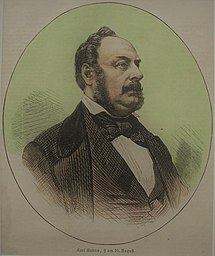Karl Andree
- Machine translation, like DeepL or Google Translate, is a useful starting point for translations, but translators must revise errors as necessary and confirm that the translation is accurate, rather than simply copy-pasting machine-translated text into the English Wikipedia.
- Consider adding a topic to this template: there are already 9,160 articles in the main category, and specifying
|topic=will aid in categorization. - Do not translate text that appears unreliable or low-quality. If possible, verify the text with references provided in the foreign-language article.
- You must provide copyright attribution in the edit summary accompanying your translation by providing an interlanguage link to the source of your translation. A model attribution edit summary is
Content in this edit is translated from the existing German Wikipedia article at [[:de:Karl Andree (Geograph)]]; see its history for attribution. - You may also add the template
{{Translated|de|Karl Andree (Geograph)}}to the talk page. - For more guidance, see Wikipedia:Translation.

Karl Andree (20 October 1808 – 10 August 1875) was a German geographer, publicist and consul.
Biography
Andree was born in Braunschweig. He was educated at Jena, Göttingen, and Berlin in historical science. After having been implicated in a students' political agitation he became a journalist, and in 1851 founded the newspaper Bremer Handelsblatt. From 1855, however, he devoted himself entirely to geography and ethnography, working successively at Leipzig and at Dresden. During the American Civil War, he advocated the cause of the secessionists. In 1862 he founded the important geographical periodical Globus. He died at Wildungen. His son Richard Andree followed in his father's career.[1]
Works
His most famous works include North America in geographical and historical outline (Nordamerika in geographischen und geschichtlichen Umrissen) (Brunswick, 1854) or Buenos Aires and the Argentinian Republic (Buenos Ayres und die argentinische Republik) (Leipzig, 1856). In Geographic Migrations (Geographische Wanderungen) (Dresden, 1859), he put emphasis on ethnological moments and argued that ethnology should be considered a main foundational point of political science. He understood the term ethnology (German: Völkerkunde) to be defined as concerning racial anthropology and not as comparative cultural anthropology.
- Geographie des Welthandels (Stuttgart, 1867-1872)
References
- Attribution
 This article incorporates text from a publication now in the public domain: Chisholm, Hugh, ed. (1911). "Andree, Karl". Encyclopædia Britannica. Vol. 1 (11th ed.). Cambridge University Press.
This article incorporates text from a publication now in the public domain: Chisholm, Hugh, ed. (1911). "Andree, Karl". Encyclopædia Britannica. Vol. 1 (11th ed.). Cambridge University Press.- Wilson, J. G.; Fiske, J., eds. (1900). "Andree, Karl Theodor" . Appletons' Cyclopædia of American Biography. New York: D. Appleton.
- v
- t
- e
  | This article about a German scientist is a stub. You can help Wikipedia by expanding it. |
- v
- t
- e













